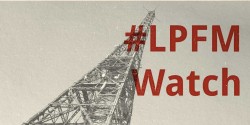Just one LPFM construction permit was issued by the FCC in the past week, to the Community Advocacy Coalition of Ventura County, in Oxnard, California. As construction permits issued 18 months ago are expiring some of the other low-power radio action pertains to extensions for stations that are not yet on the air. For instance, in Portland, Oregon five different groups recently had their extensions approved for another 18 months.
A Tampa, Florida area commercial radio broadcaster is targeting a LPFM station for allegedly not broadcasting an “educational program,” requesting that the FCC suspend the low-power station’s license. According to a complaint filed with the Commission, Beasley Media Group expresses concern that WVVF-LP is broadcasting “Latin Classic Hits” and “Adult Tropical” formats which deviate from what was proposed in its license application, which included programming like live poetry and short story reading, a local history show, and interviews with local citizens. It should be noted that the licensee also proposed music programming.
Furthermore, Beasley complains that WVVF has “adopted the on-air moniker ‘Viva FM,’ mimicking the type of branding employed by other commercial Spanish popular music formatted stations in the United States… (and) in local television interviews representatives of WVVF-LP have promoted the station as an ‘alternative’ to Tampa’s existing Spanish-language commercial stations.”
That last point is pretty much the crux of Beasley’s objection, that WVVF is posing unwanted competition to its own Tampa-area stations. Beasley
LPFM engineering and advocacy group REC Networks released a statement “admonishing” Beasley. REC argues,
"Regardless of the content the station ends up programming, the First Amendment precludes the FCC from taking action on entertainment format. The Commission only has the authority to take action on unprotected forms of speech such as commercial content and indecent material outside the designated safe-harbor hours.
Indeed, the Commission is loathe to get involved in issues related to programming that fall outside of the constraints noted by REC. While many LPFM applicants do detail their proposed programming, groups are not beholden to these, and there is no history of the FCC taking action against stations that fail to air the exact programming cited in their applications.
The fact that a commercial radio group with stations broadcasting with tens or hundreds of times the power is threatened by a relatively puny 100-watt LPFM likely indicates that there is room for innovation in serving a still-underserved audience in the Tampa area.



